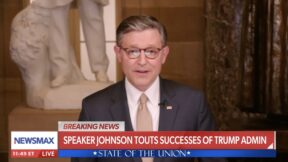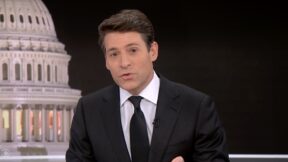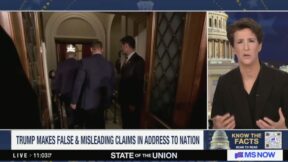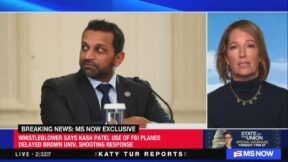‘I’m Going To Say Again And Again If Necessary!’ Merrick Garland Loses Patience With House Republican in Testy Exchange
North Carolina Republican Rep. Dan Bishop severely tested Attorney General Merrick Garland’s patience Wednesday as the two battled over who it was that decided when it was time for David Weiss to be appointed Special Counsel to investigate Hunter Biden, and under what circumstances the statutes of limitations were allowed to expire on more serious charges President Joe Biden’s son could have faced.
At the House Judiciary Committee hearing on Oversight of the U.S. Department of Justice on Wednesday, Garland faced repeated critical questioning from Republicans over the handling of investigations related to the President and his son. Republicans are launching an impeachment inquiry that is related in large part to issues of money and influence-peddling alleged against both Bidens.
Rep. Bishop spent upwards of five minutes grilling the Attorney General on two points specifically: who made the determination some weeks ago that it was time to empower Weiss as special counsel, and whether or not Garland was aware of the circumstances behind investigators and prosecutors allowing the statutes of limitations to expire on more serious charges that the younger Biden could have faced but now won’t.
At one point, after Bishop had rephrased the same question several times attempting to get a particular response, Garland lost his patience.
After Garland said that the investigators were “fully aware” of all “relevant law,” Bishop snippily remarked, “I’m not asking for the excuses. I’m asking whether you’re aware of that fact, sir.”
Equally irritable, Garland replied, “I’m going to say again. I’m going to say again, and again, if necessary. I did not interfere with did not investigate, did not make determinations.”
“Everybody in the country now knows, who’s paying attention to this, that the Justice Department permitted statutes of limitations to expire,” said Bishop. “Every lawyer who’s ever practiced understands the implications of allowing statutes of limitations to expire. Do you not even know as you sit here whether it occurred or not?”
“Prosecutors make appropriate determinations on their own. In this case, I left it to Mr. Weiss whether to bring charges or not,” Garland replied. “That would include whether to let statute of limitations expire or not, whether there was sufficient evidence to bring a case that was subject to the statute of limitations or not, whether there were better cases to bring or not.”
The sparks were also flying between the Republican and Democrat members of the committee themselves, not just the witness at the contentious, blockbuster hearing.
BISHOP: Mr. Attorney General, you’re the only person who could ensure that Mr. Weiss had all the necessary authority, aren’t you?
GARLAND: I’m the only person who can assign an agreement with respect to special counsel. The authority to do Section 515 can be signed by other people in the department.
BISHOP: You’re aware — ultimately, though, the authority is yours.
GARLAND: Yes.
BISHOP: You made the point that you don’t take orders from the president about such things. You decide ultimately what the Justice Department will do.
GARLAND: I announced at the beginning, I promised that he would be able to bring whatever cases he wants. And I have followed through on that promise. I’m permitted to make that kind of promise, and I have made it.
BISHOP: Did you undertake to inform yourself, to, to interact with him sufficient to ensure that he knew he possessed that authority, or that you would see to it that he had all necessary authority?
GARLAND: I don’t think there’s any doubt that he knew. He has written three letters to this committee indicating that he understood he had that authority.
BISHOP: You’re also aware, though, aren’t you, sir, that a senior IRS investigator whistleblower came forward and hence testified publicly that Mr. Weiss stated that he did not have such authority. He was not the decider. Are you aware of that?
GARLAND: I’m aware of the testimony. I was not present at any point during that statement. And Mr. Weiss, who was present, has indicated that he had the authority and he knew that he had it.
BISHOP: Subsequent to those developments, though, you decided to make Mr. Weiss Special Counsel, which you had not done before.
GARLAND: Mr. Weiss made clear he did not ask me to be Special Counsel until last month. And last month I made him Special Counsel.
BISHOP: Did you have some lack of information that you should have had that would have caused you to act earlier to make him Special Counsel?
GARLAND: Mr. Weiss did not ask to be Special Counsel before.
BISHOP: I understand he didn’t ask. You said that, sir. Did you take the necessary steps to inform yourself what authority he understood he had or what obstacles he was encountering?
GARLAND: Look, Mr. Weiss had, as I said from the beginning, the very beginning, that he had authority over all matters that pertain to Hunter Biden.
BISHOP: Have you, have you, have you learned that he was, in fact, deterred by decisions of the United States Attorneys in the District of Columbia, in the northern District of California, from proceeding as he thought best?
GARLAND: With respect, Congressman, Mr. Weiss has said, has not said that he was deterred. He said that he followed the normal processes of the department and that he was never denied the ability to bring a case in another jurisdiction.
BISHOP: Well, what changed then, Mr. Attorney General? What made you decide that it was sufficient to leave him in the situation he was until you decided to make him Special Counsel?
GARLAND: Mr. Weiss asked for that authority, given this extraordinary circumstances of this matter. And given my promise that I would give him any resources he requested, I made him Special Counsel.
BISHOP: So until that time, it was just a matter of his predilection, or did you, did you undertake to investigate and discern what he was doing with his authority and what and whether he faced any obstacles?
GARLAND: I did not endeavor to investigate because I had promised that I would not interfere with this investigation. The way to not interfere is not investigate an investigation.
BISHOP: Once he requested to be named Special Counsel, having not done so over months and months of your tenure, did you ask him what had changed that that made him now need to be a Special Counsel?
GARLAND: Mr. Weiss asked to be made Special Counsel. I had promised that I would give him all the resources he needed, and I made him Special Counsel.
BISHOP: When did the Justice Department permit statutes of limitations to expire on some of the prospective charges against Hunter Biden for tax violations?
GARLAND: I don’t know anything about the statute of limitations here. The investigation was in the hands of Mr. Weiss to make the determine, the determinations that he thought were appropriate.
BISHOP: Are you unaware the tax, that the statutes of limitations have in fact been allowed to expire after there having been tolling agreements in place?
GARLAND: I say again, determination of where to bring cases and which kinds of cases to bring was left to Mr. Weiss.
BISHOP: Yes, sir. I understand that you’ve said that. That’s part of the problem. The question is, are you aware the statutes of limitations have been allowed to expire while the matter was under investigation?
GARLAND: The investigators were fully familiar with all of the relevant law.
BISHOP: I’m not asking for the excuses. I’m asking whether you’re aware of that fact, sir.
GARLAND: I’m going to say again. I’m going to say again, and again, if necessary. I did not interfere with did not investigate, did not make determinations…
BISHOP: See those those are statements in response to other questions. Everybody in the country now knows, who’s paying attention to this, that the Justice Department permitted statutes of limitations to expire. Every lawyer who’s ever practiced understands the implications of allowing statutes of limitations to expire. Do you not even know as you sit here whether it occurred or not?
GARLAND: Prosecutors make appropriate determinations on their own. In this case, I left it to Mr. Weiss whether to bring charges or not. That would include whether to let statute of limitations expire or not, whether there was sufficient evidence to bring a case that was subject to the statute of limitations or not, whether there were better cases to bring or not.
JORDAN: The time, gentlemen, has expired.
Watch the clip above via C-SPAN.
New: The Mediaite One-Sheet "Newsletter of Newsletters"
Your daily summary and analysis of what the many, many media newsletters are saying and reporting. Subscribe now!






Comments
↓ Scroll down for comments ↓